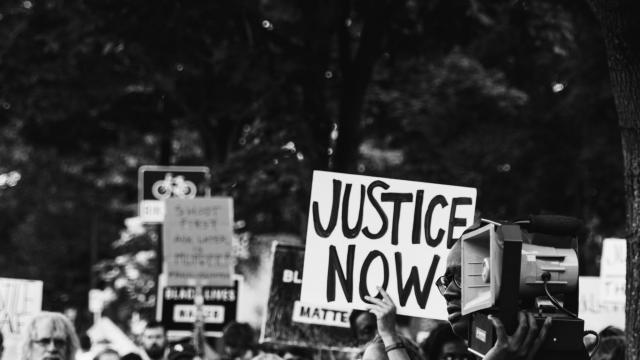
Racial Injustice

Social and Racial Justice in the Classroom & Beyond
“Striving for social justice is the most valuable thing to do in life.”
- Albert Einstein
The Human Rights Institute would love to share Lesson Planet's selection of resources curated by a team of teachers who work tirelessly to offer the education necessary for students around the world. The Lesson Planet provides social and emotional learning activities to help develop the social awareness of students while laying a strong foundation for an inclusive and faire school culture.
Pre-K - 5th Grade
Teach your elementary aged learners how to be emotionally and socially intelligent. Use the resources in this collection to enhance social skills, teach youngsters to stand up against bullies, accept others, and provide ways for dealing with stress, anger, and everything in between. These resources serve value at the beginning of the school year, as well as anytime during the school year.
How to be Socially and Emotionally Intelligent
7th Grade - 12th Grade
How do you teach classes to recognize and confront intolerance? To recognize their preconceptions and commit to change? The materials in this collection, prepared by the Museum of Tolerance, are designed to achieve these goals. Whether or not a visit to the Museum is in the works for your classes, they will benefit from the activities and exercises in this collection designed to promote tolerance and understanding.
Museum of Tolerance: Teaching Tolerance
9th Grade - 12th Grade
Social justice is the theme of a 12-lesson unit that uses photographs to focus students' attention on and expand their understanding of current social issues facing society. Class members learn how to closely examine an image, and to consider how the photographer frames a picture to create meaning and evoke a response.
Using Photographs to Teach Social Justice
9th Grade - 12th Grade
The reporting, both in professional news sources and on social media, of the events surrounding the death of Michael Brown in Ferguson, Missouri provides 21st Century learners with an opportunity to consider how social media can influence perception of events. Using the events in Ferguson as a case study, the collection begins with a resource on how to establish a safe environment for discussing highly charged issues. Other resources examine how bias can influence reporting, the importance of and difficulty in verifying reports, the power of images, and concludes with a consideration of social media as a tool for change.
Facing Ferguson: News Literacy in a Digital Age
9th Grade - 12th Grade
Introduce high schoolers to the Universal Declaration of Human Rights with a four-lesson collection. Class members watch videos, examine illustrations from the book We Are All Born Free, create a visual display promoting human rights, and discuss their own experiences with human rights issues.
Introduction to the Universal Declaration of Human Rights
Kindergarten - 5th Grade
The Civil Rights Movement is the focus of a collection created for young scholars, kindergarten through fifth grade. The unit begins with an introductory lesson that sets the stage for discussion, written assignments, interactives, research, and hands-on activities.
6th Grade - 8th Grade
From Martin Luther King, Jr. and Malcolm X to Rosa Parks and Muhammad Ali, the Civil Rights Movement united African Americans in a struggle for quality. Including an array of lesson plans, presentations, videos, activities, and worksheets, this collection provides everything you need to introduce your middle schoolers to these historic figures and guide them through a study of this pivotal era in US history.
The Civil Rights Movement: 6-8
9th Grade - 12th Grade
The Civil Rights Movement of the 1950s and 1960s, with its sit-ins, boycotts, and marches, became a model of using civil disobedience to affect change. This collection of unit plans, lesson plans, interactives, videos, and activities highlights the leaders, the events, and the laws that took center stage during this dynamic period.
The Civil Rights Movement: 9-12
All Grades
Central to democratic societies is the idea that all people are treated fairly and have equal access to opportunities and resources. This selection of lessons and activities teach students how to accomplish these goals and about the challenges that stand in the way of achieving them.
All Grades
While it may seem obvious that all people should have equal rights and protections under the law, this ideal has not been easy to attain. Use these educational resources to teach your students about the struggles throughout history of minority groups seeking equality and the challenges they still face today.
All Grades
The power to influence a society rests in the hands of its people, and while at times progress may seem slow, meaningful change is possible. These resources teach students about different historical periods of reform and the lessons that can be learned from each.
All Grades
What is the culture of your school? How can you provide social and emotional tools to your students to improve current dynamics at play? We have resources to help.
All Grades
Learning to understand, respect, and appreciate people’s racial and ethnic diversity is necessary in a fair and just society. Help students develop this social perspective with these teacher-curated lessons and activities.
All Grades
Walk a mile in someone else's shoes...easier said than done! The ability to empathize and relate to others is a key competency of social and emotional learning: Social Awareness. Help learners understand social norms and expectations, and recognize social support systems that are available to them. Lesson Planet has you covered with tons of resources to help you bring this valuable skill set into your classroom!
A page with information referencing resources targeting racial and social injustice including therapists to follow on instagram, Podcasts, Articles, and more.
Link Tree Decolonizing Therapy
Social Media to Follow!
@privtoprog
@iamrachelricketts
@derricknaacp
@naacp
@ohhappydani
@showingupforracialjustice